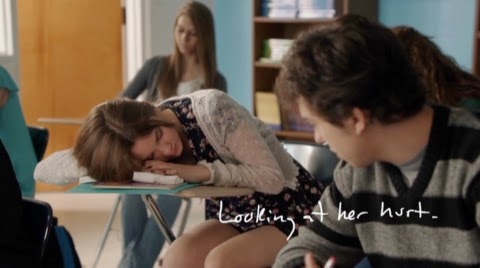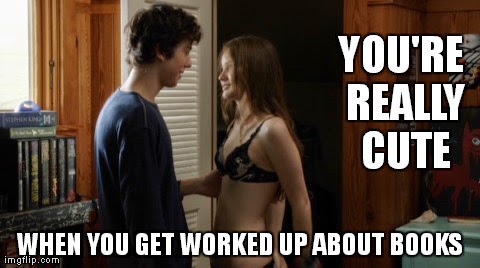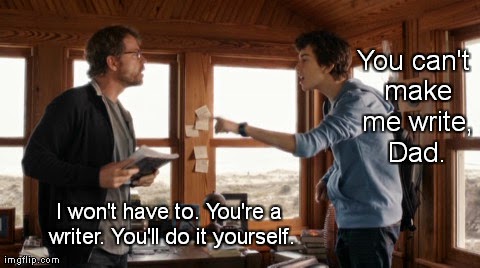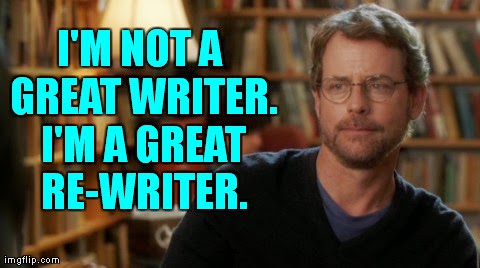
The film emphasizes the importance of opening lines by having them spoken in voiceover and written across the screen like a meme. Later, Rusty's father, Will (Greg Kinnear), a famous novelist, thumbs through his son's journal and those words pop out at him (not literally, this time). "If that was the opening line of a book," he says, "you'd have your reader hooked."
Novelists agonize over the first words of their novels. The start of a movie is just as important. When I was little, for reasons I've never figured out, I used to keep track of the first and last lines of my favorite movies. But movies are visual. The first spoken words in a screenplay are not necessarily as important as the opening image.
A movie needs to pull the viewer into its world from the first frame the way a novel draws in a reader with its first carefully chosen words. Who can't relate to sitting in a schoolroom next to that unapproachable boy or girl who's so pretty your heart aches? This opening image, and its accompanying line, sets Rusty's story into action.

When pitching a screenplay, the material is never enough to sell itself. Development execs have already heard every story that can be written. Experts say passion is contagious. People get excited about something that someone else is excited about. Whether you're trying to get someone's clothes off or just get them to read your *#$%@! script, show them that something matters to you.
On the Stuck in Love DVD commentary, Josh Boone notes how the Stephen King books on the shelf on the bottom left corner of the frame are in the exact same arrangement they were in his own room when he was a teenager. Nat Wolff has to remind him that nobody's paying attention to the bookshelf when there's a half-naked underage girl on the screen, to which Boone is almost oblivious. This is how you know this is a movie about something that really matters to the filmmaker, and something that matters to his characters just as much.

Even outside of writing, anyone can relate to growing up and reaching that point where you want to accomplish something without your parents' help. The actress related to this aspect of her role from having chosen acting to differentiate her career path from that of her father's, rock star Phil Collins. For me, it was buying a car. My father had handled everything the first time. The second time, I didn't even tell him I was looking for another until I rolled up in front of his house in my new wheels.
Sam's dilemma is more personal, as it pertains to her writing, a part of her soul. But her angst is not necessarily tied to the helping editorial hand coming from a parent. The book Toxic Feedback by Joni Cole talks about how the goal of giving feedback on writing is to find what the writer is trying to say, then helping her find the best way to express it in her own voice. Too often, "notes" are more about the feedback provider trying to rewrite a piece the way he would write it. New writers need to be careful not to implement every suggestion they get from a writers group, or the work will no longer feel like it came from you.

No one is ever forced to write a screenplay or a novel, and yet such documents do get written. Not by thinking about writing them, or talking about it, or planning to get around to it one day when you have more time and have read the latest how-to-write-a-screenplay-in-24-hours book. Books and movies get written because someone sits down and writes them. Those people are called writers. No one else may claim that title or award it to you.

In a sense, writing is a chance to rewrite experiences from our own lives, but better. Stuck in Love itself is a semi-autobiographical example. "I was in love with a girl in high school named Kate," Boone reveals on the commentary, "and Nat Wolff plays kind of a version of myself. Like a sexier, more talented version of me." Rusty's parents' post-divorce relationship is among Boone's other revisions from his own life.
Interestingly, the line about rewriting was a rewrite itself. Greg Kinnear came up with the idea, and Boone worked it into the script. Similarly, Jennifer Connelly felt her character needed to be in one scene, a book release party for Sam, in which she did not originally appear in the script. The rewritten version ended up being the most emotionally powerful moment of the film.
Rewriting is not fixing typos. Good rewriting pushes you to make your script the best it can be in ways you never thought possible.
Stuck in Love is available on DVD, Blu-ray, Amazon streaming, and Netflix. Director Josh Boone's next movie, The Fault in our Stars, adapted by Scott Neustadter & Michael H. Weber ((500) Days of Summer, The Spectacular Now) from the best-selling novel by John Green, opens on June 6. Boone is also adapting Stephen King's The Stand.
No comments:
Post a Comment